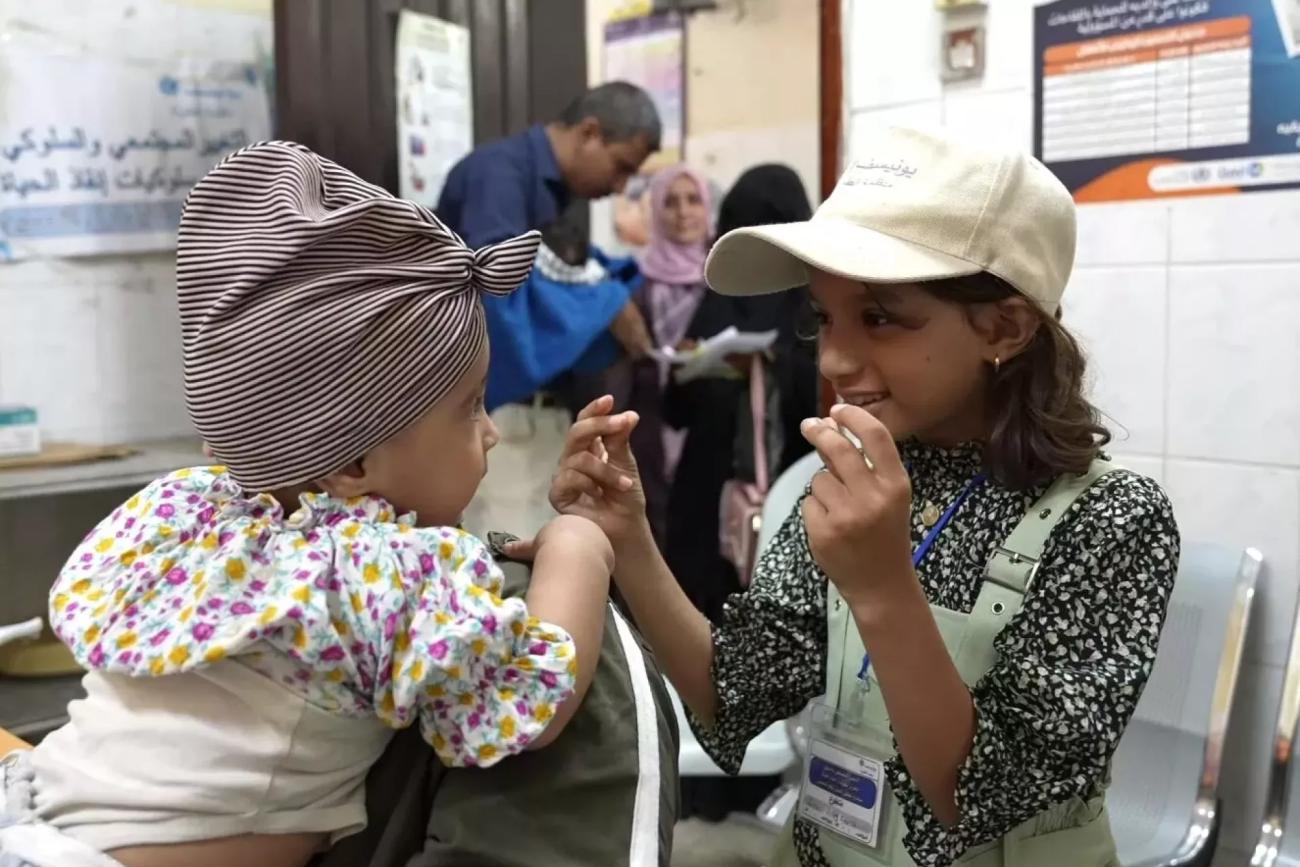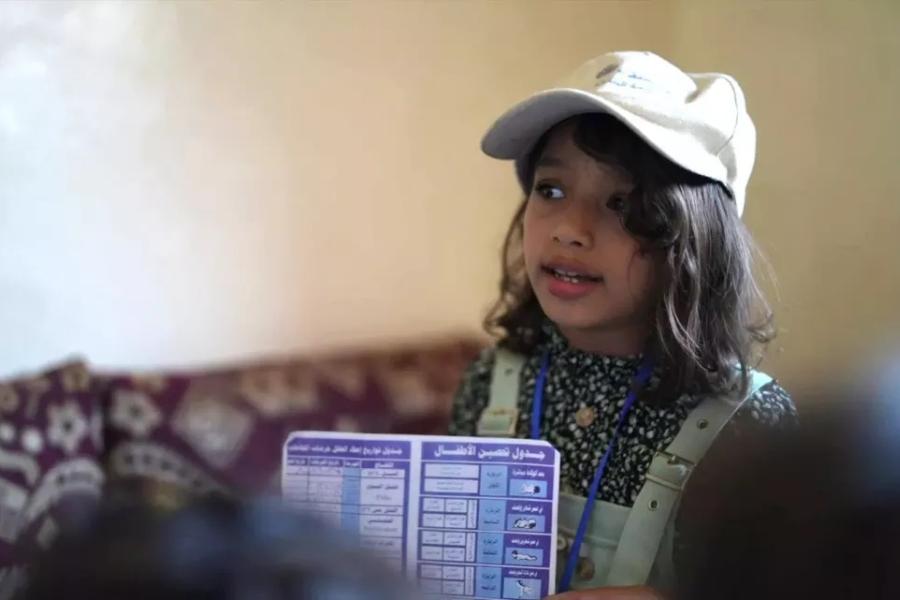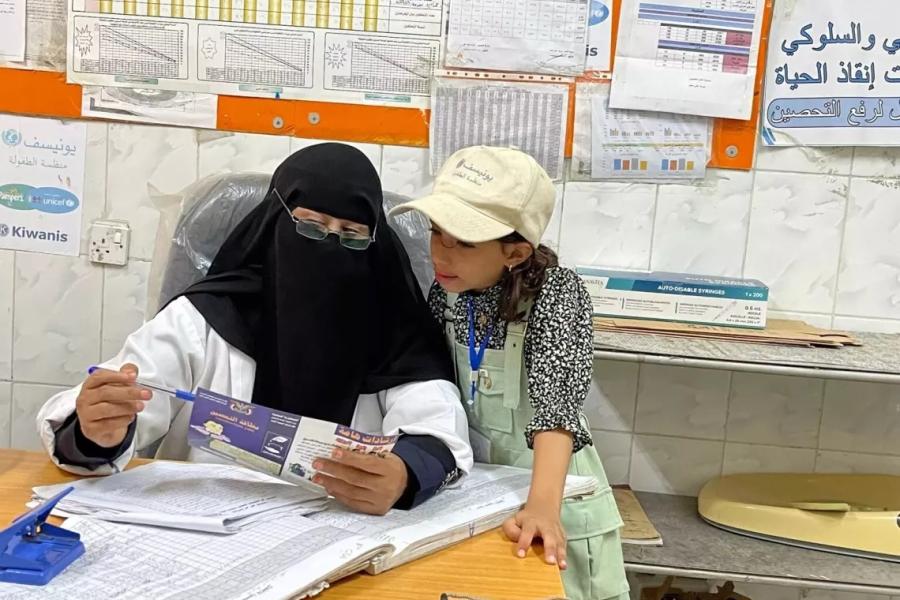UNICEF Yemen: Little changemakers boost vaccination efforts in Yemen

Young volunteers are helping to counter outbreaks of vaccine-preventable diseases.
“At first, I was scared of injections,” Leen says as she remembers how she used to feel when it came time to get vaccinated. “But I saw what happened to children who weren’t vaccinated. They got a fever and a red rash because they had measles.”
Leen is just 10 years-old, but she has already seen the life-saving potential of routine immunization. Carrying a booklet detailing the benefits of vaccines – and armed with a lot of enthusiasm – she uses her spare time to go door-to-door in her neighbourhood in Aden, in southern Yemen, encouraging other people to get vaccinated.
“I realized how crucial vaccination is, so I wanted to help [my neighbours],” she says.
Leen signed up with UNICEF’s ‘Sponsor a Child’ initiative three months ago, joining more than 1,000 children and adolescents aged 10 to 17 who have helped reach more than 33,000 children in southern Yemen with routine vaccinations over the past two years.
Children enrolling with the programme receive training that empowers them to talk with caregivers about vaccinations and how best to share accurate information about dosages. They’re accompanied on their visits by adult community mobilizers – typically health workers or community midwives – who provide additional support and guidance as the volunteers speak directly with members of the community.
Leen recalls a visit with Somaia, whose three young children hadn’t received any vaccines. Leen was joined at Somaia’s apartment by an adult community mobilizer, and between them they reminded the mother about the importance of vaccinations and also provided her with a vaccine schedule.

“To persuade her, I said ‘Look how healthy and strong I am! I can go to school, and that’s because I’ve received all the necessary vaccines,’” Leen recalls.
Somaia says the visit definitely made a difference for her family.
“I didn’t get my kids vaccinated before,” Somaia says. “But Leen visited us and explained that if my children had been vaccinated, their measles symptoms might have not been that severe. I was motivated to go to the health facility and get them vaccinated,” she says, adding that she also decided to get the tetanus vaccine for herself.
Troubling trend
Measles and rubella are highly contagious and major causes of child mortality and congenital disabilities, yet both diseases can be prevented through vaccination. By late November 2023, a total of 50,795 suspected cases of measles and rubella had been reported in Yemen, resulting in more than 560 associated deaths – a sharp increase from the 27,000 suspected cases and 220 deaths recorded for the whole year of 2022, according to the World Health Organization.
The rise in cases comes against the backdrop of nearly nine years of conflict, which have led to economic collapse, poverty, massive displacement and shattered social and health systems. Only half of Yemen’s health facilities are fully functional, and those that are operational are overcrowded. As a result, UN estimates suggest that more than a quarter of children under one haven’t received the full dose of measles and rubella vaccines.

Leen’s commitment to getting children vaccinated goes beyond just the door-to-door visits – she also accompanied Somaia and her children to the nearby health facility when the family received their first shots, comforting the baby as she received her vaccines. So far, she has helped more than 150 children receive life-saving vaccines.
“I’m really happy that Somaia and her children received vaccinations after my visits,” Leen says. “My role is important because I talk with the parents directly and tell them how vaccination can protect their child.”

